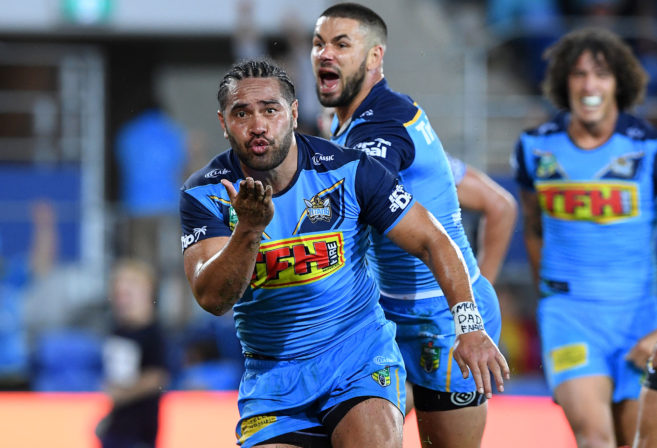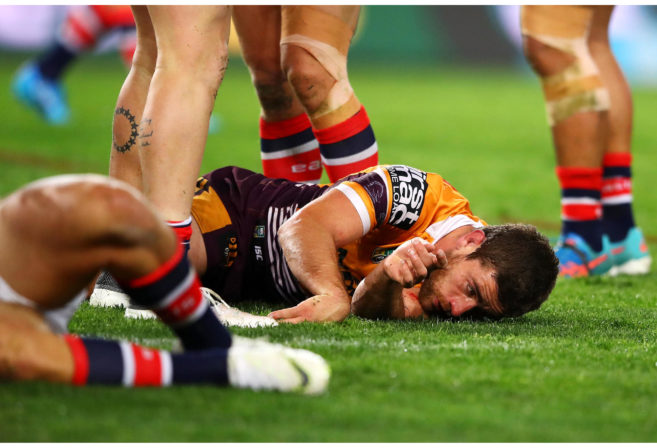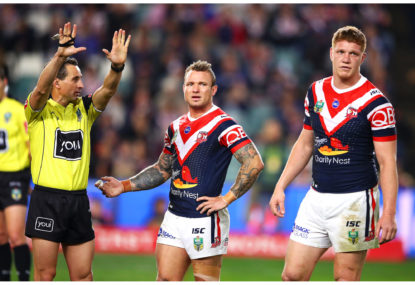Rugby league is a contact sport. But some things can be prevented. And the NRL would be setting a dangerous precedent if they don’t suspend Dylan Napa.
Fortunately, the hit, which saw Andrew McCullough floored in the 23rd minute of the Roosters and Broncos clash on Saturday night, hasn’t seriously injured the Brisbane hooker.
But after a similar incident left Broncos forward Korbin Sims with a broken jaw, it’s clear this is no accident.
Given it is the second time this has happened this year, it’s evident that it was a tackle that could have been avoided.
In the NRL’s Laws and Interpretations Guide, it states: “A player is guilty of misconduct if he… when affecting or attempting to affect a tackle makes contact with the head or neck of an opponent intentionally, recklessly or carelessly.”
Sure, you can argue all you want that the contact on McCullough wasn’t intentional. I highly doubt it was. After all, the pair were teammates in Queensland State of Origin camp.
And even if they didn’t have a close relationship, I don’t know many players who go into a tackle deliberately trying to injure their opponents.
Was it careless? It most certainly was.
I mean, after seriously injuring Sims earlier in the year, Napa refused to alter this tackling technique on the basis that it was an accident.
However, it shouldn’t be too hard for Napa to fix his ways anyway.
After all, this is all about him changing his technique. And the fact that he plays an aggressive style of footy is no excuse to suggest that he can’t change his ways.
You only have to look at the effort Konrad Hurrell put into amending his running style.

Konrad Hurrell of the Titans. (AAP Image/Dave Hunt)
In 2015, the then-Warriors centre was suspended for three weeks after he lifted his knee when approaching Cronulla forward Anthony Tupou, breaking his jaw.
It was a worrying trend for Hurrell and the judiciary responded accordingly.
His only other discretion came in the 2016 Auckland Nines, when Hurrell again came under scrutiny after his knee made contact with Manly lock Jake Trbojevic.
Hurrell’s actions weren’t intentional. But nonetheless, they were careless as he would have known the potential damage he could have caused the Sea Eagles forward given what happened to Tupou.
And to his credit, he made the decision to make an effort to alter his technique, despite the fact that it was a running style he had adopted since his childhood.
“I try to run hard and went the wrong way and hurt the other guy,” Hurrell told the NZ Herald in 2016 following the incident.
“It would be hard for me to change, because I’ve been running like that since I was 12.
“But I need to look at it and work on it.”
A stark contrast to Napa’s denial after the first incident earlier this year.
And you can’t blame him given he wasn’t even made to front the judiciary. Perhaps they too thought it was just an accident and decided to give him another chance.
Well, that chance is up. And now the judiciary must act.
Napa may go to training next week with the intent of changing his technique. However, the only way to ensure that this is the case is to suspend him.

(Photo by Mark Kolbe/Getty Images)
There needs to be some form of deterrent, similar to the one Hurrell faced a couple of years ago, to force Napa to accept that until he changes his ways, his team will suffer the consequences.
We don’t want to see another tragic death that could have been prevented.
While the game is a contact sport and therefore there will always be risks in playing, it is about minimising these risks.
The shoulder charge was banned from the game in 2013 for the potential harm it posed to players.
This harm was unfortunately made clear to the rugby league community in 2015 when James Ackerman passed away after suffering a ruptured artery in his neck from a shoulder charge delivered by Francis Molo in the Queensland Cup.
Molo, who was playing for Broncos feeder club North Devils, was handed an eight-match suspension, only to return to be suspended another two times the following year for shoulder charges.
While obviously concerned about Molo’s welfare, coroner John Lock concluded that the Brisbane Broncos didn’t do enough to specifically address his tacking technique, leading to his infringements following the incident in 2015.
These were exceptional circumstances and thankfully we haven’t seen such an incident since Ackerman’s fatal death.
The game learnt from it and made it clear that the ban on the shoulder charge was there to stay.
A similar stance needs to be taken against Napa.
Now, this isn’t about trying to condemn him as some sort of villain. Nor is it a call to single him out as a threat to player safety.
Rather, it is a plea to the NRL to help Napa or any other player with a dangerous habit that poses a risk to the safety of our game.
And a suspension is certainly a start in ensuring Napa and the Roosters directly confront the problem – for both his sake and that of other players.































































































